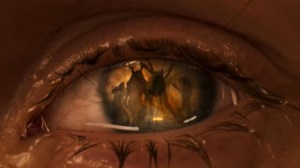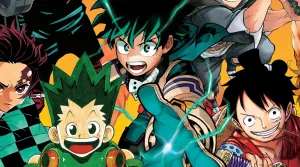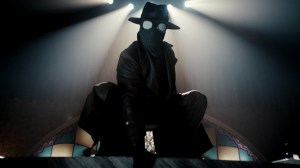Deadpool is already one of Marvel’s most popular characters. Now he’s becoming the center of an extended Deadpool family of books.
Videos by ComicBook.com
Wade Wilson recently put together a team of mercenaries he liked to call the Mercs for Money. Most of the members of that team didn’t care for Deadpool’s leadership style, and so now they’re breaking out on their own. Now the Mercs for Money has a brand new lineup, and it’s the mutant Domino, not Deadpool, who is taking the lead.
ComicBook.com spoke to Jordan White, the editor of Marvel’s Deadpool line, about the new books featuring former members of the Mercs for Money, including Slapstick, Solo, and Foolkiller. White also touched on the new Deadpool and the Mercs for Money lineup, including the popular Negasonic Teenage Warhead, Deadpool’s feud with the maniacal Madcap, and the future of Deadpool 2099.
Be sure to check out the Deadpool #22 preview pages in the gallery below, and check back with ComicBook.com for the second part of our interview with White, in which we discuss Marvel’s Guardians of the Galaxy and Star Wars lines.
There are several books spinning out of Deadpool and the Mercs for Money – Solo, Slapstick, and Foolkiller. Why were these characters chosen for solo series as opposed to the other Mercs for Money?
Jordan White: That’s a good question. For each of them, I think it’s slightly different answers. With Solo I think that was the one that Gerry Duggan gravitated to the most, that’s the one where he enjoyed the ideas that he had for him the most. He was like, “Can I work on that?” Then we brought in Geoff Thorne to work with him on it. I think what Gerry liked about Solo was the fact that he is this underdog mercenary, the idea that he’s been around a long time but he’s not well known and he’s not famous. One of the things we do in our Deadpool books is embracing a little bit of the meta-reality of things on some level. As a commentary, you can think about his status in the real world amongst readers. He’s been around for a long time and if anybody knows him they probably know him as, “Yeah, that doofy guy.” Gerry liked the idea that he was good at his job, he knows what he’s doing, but everybody thinks, “Whatever, what a lame-o.”
Each of the spinoffs takes a slightly different piece of the Deadpool puzzle and runs with it. I think that Solo plays into the action-comedy side of Deadpool that we would emphasize, more in line with a Lethal Weapon thing. It’s action first but then there’s a lot of humor to it. As soon as Gerry and Geoff started talking about it, they came up with a ton of fun ideas. They love the relationship he has with his wife, or ex-wife, or his estranged wife – I’m not 100% sure if they’re divorced, I have to go double check. It’s a lot of fun. That’s Solo.
For Foolkiller it’s that in working with him in the Deadpool books the idea that he became a therapist was so appealing to us. When we brought that idea to Max Bemis and said, “Okay, this guy whose thing is that he kills people he thinks are foolish, but now he’s going to try to help people but if it doesn’t work out there’s always killing them for being foolish.”
Max was like, “That’s amazing, I have so many ideas for it.” On that one, we’re playing with the real twisted side of the Deadpool stuff we’ve done. The messed up stories. For people who love some of the more twisted Garth Ennis books, this is a book for them. Max is good at a very dark humor that makes us cackle with glee when we read his scripts. It’s very fun stuff but in the evilest ways.
As far as Slapstick goes, Slapstick was the character, back when we were planning out the Mercs in the first place, Slapstick was the one that I was behind adding to the team because I was like, “if you’re trying to look at these kinds of characters and to generate something with a Deadpool flavor, you can either take a dark character and try to inject humor into it,” which is what we did with Solo. Before he was in Deadpool, Solo was much more of a straightforward tough guy character. We’ve brought humor to him.
Or you could find a funny character and bring darkness to him. With Slapstick, I remember loving Slapstick when I was a kid, but we could take him and be like, “What kind of awful things have happened to him to make his life terrible since then?” We decided that being stuck in cartoon form and not being able to turn human at all would be the best way to do it.
The other reason we wanted to do a spinoff about him is that we wanted to try experimenting with doing an ongoing series in the Infinite form and as soon as we thought about who would be good for that, Slapstick jumped out at us. His powers are so visual and fun that they are perfect for that. From there it was a natural jump to bring on Reilly Brown because I honestly believe he does the best Infinite Comics. He’s terrific at it and he’s co-writing that with Fred Van Lente, who I’ve worked with before back when he was on Hercules and things like that.
This book is so funny. It is out an Infinite Comic right now, and it will go on sale in print in December. It’s amazing. Reilly and Fred like to say that if Deadpool is too highbrow for you, this is the book for you. That definitely takes all of the slapstick humor, all of the fart jokes that you could handle, but also sticking with some crazy unexpected gore in there as well, which is fun. The approach that they’ve taken to Slapstick totally took me by surprise and I love it.
The other thing is that we’re working hard to make the art very distinctive. We have the artist Diego Olotegui, he’s drawing based on Reilly’s layouts. We said to him, “Definitely make sure that Slapstick looks like a cartoon character but the rest of the world is real.” Between what he’s done in the line art and what the colorist Jim Campbell has done, I think he absolutely pops off the page Roger Rabbit-style, as that guy is a cartoon and that guy is a real guy. It looks so distinctive and neat and the book is so funny.

Is there a unique challenge in bringing a cartoon character like Slapstick to life in the Marvel Universe, especially considering how the Marvel Universe being the “real world” superhero universe has always been trumpeted as one of the things that make Marvel stories so great?
JW: I would say no and that’s what I love about the Marvel Universe most of all is that it is so elastic that it can fit anything. That Slapstick is in the same universe as Foolkiller or as the Punisher, or that the Squirrel Girl comic is just as in continuity as the new Punisher series that is 100% realistic and serious and gritty. I love that and I love that then at some point somebody is going to write those characters interacting.
What’s part of the fun of the Slapstick series is that he is so ridiculous, but we’re trying not to play the entire universe as ridiculous. Certain parts of it and certain parts of the things that he faces will also be very silly and funny but it all still takes place in a world where the people are living their general lives and are not used to the fact that there’s a weird cartoon person fighting something in front of them.
You described Solo as a kind of action hero. What sets him apart from other heroes of that mold?
JW: That’s a good question. Like I said before, we do like the fact that he’s very much an underdog. In this story that we’re kicking off with issue #1, the only reason that Dum Dum Dugan calls him into S.H.I.E.L.D. is to be a patsy. He’s like, “This op is already messed up, let’s call in Solo because he’s expendable and we can blame this on him.” Of course Solo has no idea. Solo thinks, “They finally realize how great I am and are calling me to the big leagues.” Of course, he’s not going to be made a fool of willingly, only by accident and only by his own hand. Obviously, things are not going to go exactly the way he expects, but they’re certainly not going to go the way Dum Dum expects either because he’s more competent than they think he is for certain.
As you mentioned, Max Bemis is writing Foolkiler. It is publicly known that he is diagnosed as bipolar, and that’s an idea he explored in his first comic, Polarity for BOOM! Studios. How has Bemis’ own mental health experience affected his take on Foolkiller as a therapist?
JW: I don’t think he’s ever murdered any of his patients if that’s what you mean. No, we definitely knew that as well. We knew that it’s a topic, the whole concept of mental health, is something that Max is very interested in and has a lot of ideas about. Obviously, like you said, Polarity, as well as one of his arcs of Crossed: Badlands was also very therapy related. Not for young readers but there you are.
When we brought that idea to Max we said, “What do you think about this character?” He was super excited for that very reason. He’s like, “That’s exactly in my wheelhouse. That’s what I want to be writing about. Yes, definitely.” His enthusiasm for it absolutely shows in the story.
With all of these spinoffs, Deadpool and the Mercs for Money has undergone quite a transformation. Cullen Bunn is still writing the series, but now Domino is leading a new team of Mercs. How does this roster shakeup change the tone and the stories told in Deadpool and the Mercs for Money?
JW: The biggest thing to say about that is that, while obviously the fact that the entire cast of the book has left the book comes as a bit of a surprise to the readers, Cullen and us knew going in that that was going to be the case. Cullen had the very difficult job of launching a book knowing full well that almost every character he was writing was going to leave the book, which is why if you look at that arc, the topic of the arc is, “Deadpool is a terrible leader.” That’s the story of the book so that you could read and see that they’re all on the team and then them leaving is absolutely a natural progression.
You’ll also see, obviously now that we revealed the new team, that Cullen features all the new team members through those first couple issues as well. We got to see Machine Man, we got to see Gorilla-Man, Domino as his confidante, Negasonic Teenage Warhead obviously was an important part of the first issue. Hopefully, it won’t be completely shocking that they all show up as Deadpool’s backup in issue four.
We brought Cullen in on that saying, “Here’s a book, but here’re five hoops you need to jump through in order to make it.” He executed it perfectly. I think he did a great job of making all that happen in a way that reads well.

You mentioned that Negasonic Teenage Warhead is now part of the Mercs for Money team. Are there plans to explain where Negasonic has been in the time between Deadpool and the Mercs for Money #1 and when we last saw her in the Marvel Universe?
JW: I think Cullen definitely has thoughts on that. The last time she appeared would have been during the “Necrosha” X-Men event, where she came back from the dead among a few other characters, some of whom are still alive, some of whom are no longer alive. Her power set was never super well defined in her original appearances because she didn’t have that many and didn’t do that many different things. Other than that she could see the future, there wasn’t a whole lot said about it. Cullen, in bringing her in, had a lot of ideas about, “What is she about and how does she work? Why is she alive?” In issue #1, we saw her seeming like a totally normal teenage girl in a house and then when they took her out of that house and drove away the house vanished. What does that mean? Definitely, Cullen has very specific ideas about how she was where she was and why. I’m not 100% sure exactly when we’re going to tell that story but that definitely is a story he has in mind.
Deadpool #21 releases next week, and it continues the ongoing feud between Deadpool and Madcap. When and how did you all discover Madcap, a relatively obscure character, as a potentially terrifying nemesis for Deadpool?
JW: It’s funny. The reason that Madcap entered into Deadpool’s orbit was absolutely the idea for the annual by Ben Acker and Ben Blacker. When I went to them for that annual I said, “I think it would be fun to do a story that explains why Deadpool had two voices in his head for the Dan Way run, but we’re not doing that anymore.”
The real reason is when I went to Gerry and Brian [Posehn] when they started Marvel NOW!, I said, “Guys, obviously Dan Way has been doing this two voices in his head thing, it’s something that he started, he wasn’t a part of Deadpool originally. It seems to be doing well but it’s up to you. If you want to do that we can do it, if you don’t want to do it we’ve got a jump there, we can say it’s not the case anymore.”
Their response was, “No, we’d rather not because we have some thoughts,” and what ended up becoming the story was Agent Preston was in his head. “We have thoughts on other ways that there are voices in his head or other reasons there would be voices in his head.”
We didn’t use it and it’s funny, fans have reached out to me during the Dan Way run complaining. “Where did this voice thing come from? Why is it here and there’s no explanation?” Then of course when it was gone, people wrote to us and said, “What happened to the voice? Why is there no explanation for why the voice went away?” I said to Ben Acker and Ben Blacker, “Let’s do a story about the voice. Let’s explain it. Why not?”
I had pitched them an off the top of my head idea that the voices were…It was something silly like the voices were alien parasites that most characters can only have one of but because Deadpool has a healing factor, he can have two. They were like, “That’s fine but we have a better idea. What if we say that that’s Madcap?”
That story ended up being so much fun and so cool that when we looked at the Merc team, Gerry Duggan said, “Let’s bring back Madcap from that story, and that experience of being in Deadpool has changed him so instead of being the fun character that he used to be that was mildly annoying he’s now scary and horrifying and willing to do awful things to people and make him into a frightening villain instead of a goofy villain.”
By the way, as soon as he pitched that, I was like, “I’m 100% on board.” That was well before he came up with the idea of having him growing out of someone’s torso like a disgusting twin. We’re happy with where things are going with Madcap.

The January 2017 solicitations were just released and revealed that Deadpool #25 will conclude the “Deadpool 2099” story arc. What can you say about the future of Deadpool 2099?
JW: That’s a great question. So many of our big enormous Deadpool stories come from jokes that we are making to each other, me and Gerry, talking on the phone to each other. We obviously, during the previous volume, did these flashback episodes where we showed a supposed Deadpool comic from the 60’s, one from the 80’s, one from the 90’s, things like that, books that had never been published. When we were talking about what else can we do for those, at one point we said, “We should do the Deadpool 2099 issue as though it had been from the original 90’s launch of 2099.”
It was a strong idea but that percolated in Gerry’s mind and in many ways Gerry said a few times, and I think I agree with him, that the 2099 story in some ways is the emotional backbone of what is happening in this series right now because there’s this constant backstory in all the ongoing Deadpool stories about Deadpool’s relationship with his daughter and what does that mean and also Deadpool’s relationship with his wife and what that’s going through. Meanwhile, we keep cutting away to this future where it’s about one of his daughters. Then what happened to the other daughter? At this point, we’ve revealed that he has two daughters, the current one that we know is still alive and also he has one with his wife, which hasn’t occurred yet in the present.
In addition to being able to tap into that emotional personal life of Deadpool, it’s also in the year 2099, which gives it twice as much room to be crazy with what happens. That Gerry can throw in all sorts of nutty future things that don’t have to be as realistic as things that have to happen in the present. It’s so much fun. As of the most recent issue that’s out of the 2099 story, we’ve seen that both his daughter Ellie has come back and she’s laying claim to the name Deadpool, and then Warda, who was the first Deadpool 2099 we showed also is still saying no, she is Deadpool. We have old man Wade, not claiming the name Deadpool but also present and involved in the showdown. Issue #25 is going to definitely have a victor in the fight of which person gets to be Deadpool 2099 and we’re also going to find out, I don’t think we’ve told anybody this, but we’re also going to learn in issue #25 what his daughter Ellie’s mutant power is, which is something people have been asking about for a long time.
As for the future of it, I would absolutely love to do a Deadpool 2099 ongoing. If the fans out there are on board for that, please let us know, send us letters, tweet at us, because if other people like Deadpool 2099 as much as I do we’ll definitely do it.








